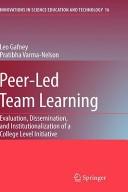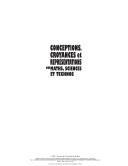| Listing 11 - 14 of 14 | << page >> |
Sort by
|
Book
Abstract | Keywords | Export | Availability | Bookmark
 Loading...
Loading...Choose an application
- Reference Manager
- EndNote
- RefWorks (Direct export to RefWorks)
Didactic strategies --- Peer-group tutoring of students --- Tutors and tutoring --- Children with disabilities --- -Children with special educational needs --- Children with special health care needs --- Children with special needs --- Handicapped children --- Physically handicapped children --- Special needs children --- Exceptional children --- People with disabilities --- Private tuition (Tutoring) --- Tutorial method in education --- Teaching --- Remedial teaching --- Peer instruction --- Student-to-student tutoring --- Education --- Peer teaching. --- Tutors and tutoring. --- Education. --- -Education --- -Private tuition (Tutoring) --- Peer-assisted learning --- Peer-led learning --- Peer mentoring (Peer teaching) --- Children with special educational needs --- Peer teaching

ISBN: 1281512516 9786611512514 1402061862 1402061854 9048175593 Year: 2008 Publisher: Dordrecht : Springer,
Abstract | Keywords | Export | Availability | Bookmark
 Loading...
Loading...Choose an application
- Reference Manager
- EndNote
- RefWorks (Direct export to RefWorks)
This book is a real-world study of Peer-Led Team Learning (PLTL), a method in which undergraduates work together, under the guidance of a peer leader, in course-connected workshops. PLTL is intended to complement lecture. The text explains how the method evolved into a teaching/learning model. The evaluation uncovered six critical components for successful implementation. Evaluation at each new site looked at implementation, comparing methods, materials, training, and organizational arrangements with what had been found to work effectively. Those disseminating the model used the critical components to frame their presentations. Dissemination of the method is carefully documented and analyzed. Evaluation of the program’s effectiveness was shared. Instructors compared grades of classes or cohorts of students with and without PLTL, with different kinds of controls. The external evaluator measured the quality of implementation, student satisfaction, the impact on leaders, and other factors. Finally, this study looks closely at institutionalization: the essential factors necessary for a program’s sustainability. The evaluation explained in this text is transportable to other programs and pedagogies. "Peer-Led Team Learning (PLTL) is one of the success stories resulting from the National Science Foundation's investment in educational innovation. Gafney and Varma-Nelson provide a coherent, tour-de-force look at the in-depth research that has been carried out, not only to understand the effect of PLTL on student learning, but also to understand the nature of the pedagogical method itself. This monograph is a jam-packed, one-stop destination for anyone who wants to learn what it means to understand a widespread pedagogical development in post-secondary science education." Brian Coppola, University of Michigan.
Peer teaching. --- College teaching --- Evaluation. --- Education. --- Science education. --- Assessment. --- Higher education. --- Learning & Instruction. --- Higher Education. --- Assessment, Testing and Evaluation. --- Science Education. --- College students --- Higher education --- Postsecondary education --- Universities and colleges --- Science education --- Scientific education --- Children --- Education, Primitive --- Education of children --- Human resource development --- Instruction --- Pedagogy --- Schooling --- Students --- Youth --- Civilization --- Learning and scholarship --- Mental discipline --- Schools --- Teaching --- Training --- Education --- University teaching --- Peer-assisted learning --- Peer-group tutoring of students --- Peer instruction --- Peer-led learning --- Peer mentoring (Peer teaching) --- Student-to-student tutoring --- Education, Higher. --- Educational tests and measuremen. --- Science --- Study and teaching. --- Educational tests and measurements. --- Educational assessment --- Educational measurements --- Mental tests --- Tests and measurements in education --- Psychological tests for children --- Psychometrics --- Examinations --- Psychological tests --- Rating of --- Learning. --- Instruction. --- Learning process --- Comprehension

ISBN: 2760512282 9782760512283 9781435690080 1435690087 9782760517462 2760517462 Year: 2003 Volume: 8 Publisher: Sainte-Foy Presses de l'Université du Québec
Abstract | Keywords | Export | Availability | Bookmark
 Loading...
Loading...Choose an application
- Reference Manager
- EndNote
- RefWorks (Direct export to RefWorks)
Une réflexion sur ce que les technologies de l'information et de la communication (TIC) apportent à l'apprentissage, sous l'angle des interactions humaines plutôt que sous celui du rapport personne-machine.
Team learning approach in education. --- Peer-group tutoring of students. --- Computer-assisted instruction. --- Telecommunication in education. --- 800.515 --- 800.515 Computerondersteunend (taal)onderwijs. Computer Assisted Language Learning --- Computerondersteunend (taal)onderwijs. Computer Assisted Language Learning --- Computer-assisted instruction --- Peer teaching --- Team learning approach in education --- Telecommunication in education --- Distance education --- Education --- Learning teams --- Group work in education --- Peer-assisted learning --- Peer-group tutoring of students --- Peer instruction --- Peer-led learning --- Peer mentoring (Peer teaching) --- Student-to-student tutoring --- Teaching --- CAI (Computer-assisted instruction) --- Computer-aided instruction --- Computer-assisted learning --- Computer based instruction --- Computer-enhanced learning --- Electronic data processing in programmed instruction --- ILSs (Integrated learning systems) --- Integrated learning systems --- Microcomputer-aided instruction --- Microcomputer-assisted instruction --- Microcomputer-assisted learning --- Microcomputer-based instruction --- Educational technology --- Programmed instruction --- Telematics --- Data processing --- Peer teaching.
Book
ISBN: 0262360748 9780262360746 9780262539722 0262539721 0262360756 Year: 2020 Publisher: Cambridge, Massachusetts : The MIT Press
Abstract | Keywords | Export | Availability | Bookmark
 Loading...
Loading...Choose an application
- Reference Manager
- EndNote
- RefWorks (Direct export to RefWorks)
"The author develops a model of peer pedagogy by examining the popular genre of Let's Play videos as a source of learning for Minecraft players"--
YouTube (Electronic resource) --- Minecraft (Game) --- Peer teaching. --- Social aspects. --- Peer-assisted learning --- Peer-group tutoring of students --- Peer instruction --- Peer-led learning --- Peer mentoring (Peer teaching) --- Student-to-student tutoring --- Teaching --- Video games --- Learning, Psychology of. --- Media literacy. --- Video games in education. --- Computer-assisted instruction. --- CAI (Computer-assisted instruction) --- Computer-aided instruction --- Computer-assisted learning --- Computer based instruction --- Computer-enhanced learning --- Electronic data processing in programmed instruction --- ILSs (Integrated learning systems) --- Integrated learning systems --- Microcomputer-aided instruction --- Microcomputer-assisted instruction --- Microcomputer-assisted learning --- Microcomputer-based instruction --- Education --- Educational technology --- Programmed instruction --- Telematics --- Electronic games in education --- Audio-visual education --- Mass media literacy --- Information literacy --- Learning --- Psychology of learning --- Educational psychology --- Comprehension --- Learning ability --- Data processing --- Psychological aspects --- GooTube (Electronic resource) --- YouTube Broadcast Yourself (Electronic resource)
| Listing 11 - 14 of 14 | << page >> |
Sort by
|

 Search
Search Feedback
Feedback About UniCat
About UniCat  Help
Help News
News